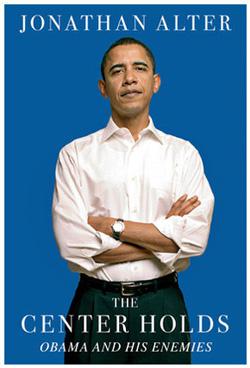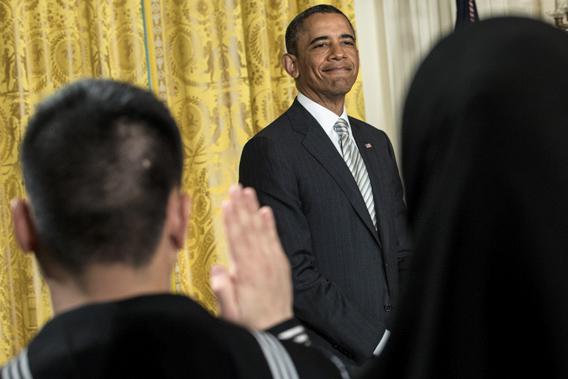For years, Barack Obama was able to keep his poll numbers high because the American public saw him as above the fray. But now that his poll numbers are dipping, he lacks the personal relationships to fall back on when the worm turns—in part because he’s stayed so above the fray. Here’s how it happened, in an excerpt from Jonathan Alter’s The Center Holds: Obama and his Enemies, out now from Simon & Schuster.
Suffering fools had always been part of the presidency. George Washington held weekly dinners with legislators—senators one week, congressmen the next. Franklin Roosevelt filled part of many workdays with 15-minute meetings with individual members of Congress, some of whom got to stay for cocktails that FDR mixed himself. Ronald Reagan and House Speaker Tip O’Neill traded barbs in public but made time for plenty of jokes in private.
By contrast, the Obamas, with the help of Valerie Jarrett, adopted an informal code in the White House. Obama would bring members of Congress into the White House for large meetings and maybe even give them a ride on Air Force One when he went to their state, but the socializing they craved, the invitations to dinner or a movie, were not often part of the package.
His excuse for not having the GOP leadership over more often was that he had repeatedly invited them and they usually said no. And he had unpleasant memories of intensely courting Republican senators in 2009 to no avail. After passage of the Recovery Act, which won the support of three moderate Republican senators, he received no Republican support at all on his other major legislative victories of 2009 and 2010. He spent many hours with Maine Republican Olympia Snowe, whose objections to Obamacare (including some from the left) he was sure he addressed. But under pressure from her leader, Mitch McConnell, she too voted no.
Obama believed that the days of politicians in Washington settling everything over bourbon and branch water (or, in the case of Reagan and O’Neill, a couple of beers) were over. It used to be that if a president leaned on a member to change his vote, most of his constituents wouldn’t find out. But in the age of instant access to voting records and 24-hour cable, the threat of being “primaried” trumped any influence that might come from a ride on Air Force One or a trip to Camp David.
Besides, Obama liked to think of himself as nontransactional, above the petty deals, “donor maintenance,” and phony friendships of Washington. Here his self-awareness again failed him. In truth, he was all transactional in his work life. He reserved real relationships for family, friends from before he was president, and a few staff. Everything else was business. The senators and billionaires who longed to brag about their private advice to the president were consistently disappointed. Defensive on this point, Obama didn’t believe that listening to powerful blowhards was generally worth his time. But that is the thing about relationships: They’re investments that don’t necessarily pay off right away. His failure to use the trappings of the presidency more often left him with one less tool in his toolbox, one less way to leverage his authority.
It was a sign of his talent that he was quite good at a part of the job that he didn’t much enjoy. At fundraisers he was lithe and charming and, most of the time, seemed fully present in the moment. Flashing that thousand-watt smile and exchanging pleasantries were enough for some, but others yearned for at least the impression of friendship, or what passes for it in Washington.
Obama wasn’t a loner, just a relatively normal person—warm with his friends—who preferred not to hang out too much with people he barely knew. This was a fine quality in an individual but problematic for a president. Part of the explanation lay in his upbringing. He hadn’t spent his early life planning how to become important, as Johnson and Clinton had. Nor was he a legacy, soaked in politics from an early age. No one had to instruct the Roosevelts, Kennedys, Bushes (and Romneys) on how to build lists and get credit for their gratitude. Bargaining was in the background of most of Obama’s predecessors. Eisenhower learned to negotiate with balky allies during the World War II, and Reagan gained bargaining experience as president of the Screen Actors Guild. Unlike Reagan, Clinton, and Bush, Obama had never been a governor herding state legislators, and his experience closing deals with Republicans in the Illinois State Senate and the U.S. Senate was minimal. (It was no coincidence that the last two presidents before Obama who went directly from the Senate to the White House were John F. Kennedy in 1961 and Warren G. Harding in 1921, and neither got much done with Congress.) In Democratic Chicago he rarely had to talk to people who fundamentally disagreed with him. His self-image was that of a bridge-builder, but he came up so fast that he’d never built a big one.
The president didn’t have the schmooze gene. Politics self-selects for certain traits, the most common of which is an essential neediness, an emotional hole many politicians are trying to fill that makes them crave attention, thrive on the artificial calories provided by superficial relationships, and make the personal sacrifices necessary for public life. Obama’s childhood in Hawaii was marked by a peculiar combination of abandonment and unconditional love. It bred self-reliance and security. By the time he left Chicago for Harvard in 1988, he had the ambition and willingness to sacrifice that is standard equipment in politicians, but he lacked the neediness that is usually part of the package. As he ascended, this made the inherent neediness of other politicians, CEOs, and other high achievers an abstraction for him, not a shared condition. The backslapping, stroking, gripping, and grinning that were second nature to politicians like Clinton and Biden were often chores for Obama. During a scene in By the People, a documentary about the 2008 campaign, Obama complains loudly to his staff about having to work rope lines. Where Clinton usually found such contact energizing, Obama frequently found it enervating. There were exceptions; at the end of a campaign, when the competitive juices were flowing, he liked pressing the flesh just fine, but he rarely stuck around to soak up the love longer than the schedule demanded. He didn’t need to.

Courtesy of Simon & Schuster; First Edition/Amazon.com
Obama wasn’t as self-pitying as many politicians, but he often complained about how hard the job was. Early on, one of his first big financial supporters, a Chicagoan, brought him up short in the Oval Office by saying, “You wanted this. We all worked like hell to put you here. Stop complaining.” Obama smiled and said he was right and not enough people talked to him that way. This supporter always knew Obama had a huge ego—anyone challenging Hillary Clinton with so little experience had to have one—but he thought Obama had been humbled by the opposition’s intransigence. He had never failed to bring anyone around before, and it changed him.
You could see it at public events in 2011, before he put on his friendly game face for the campaign. For those who knew him, and for many who didn’t, his vibe was unmistakable in the East Room: I’ll flash a smile, then, please, someone get me the hell out of here. It wasn’t that he had to be back in the Oval Office for something urgent. He just didn’t want to hang out for an instant longer than he had to, even with long-lost Chicago friends. The quality that his girlfriend from the 1980s, Genevieve cook, described as “a bit of a wall—the veil,” was back. The encounters when Obama would stand very close and use his height and star power to leave admirers swooning were rarer, except at fundraisers, when he knew he had to turn it on. He sometimes exuded an unspoken exasperation: I saved Detroit, the DOW is up, we avoided a depression—I have to explain this to all of you again?
When the president got away from elites and spent time with those he called “ordinary folks,” he relaxed. Even if they disagreed with him on certain things, most Americans still liked and trusted him. The fact that he wasn’t a typical politician and stayed above the fray was a huge asset in their minds. The same traits that hurt him in Washington helped keep his poll numbers afloat. As time went on, he began to enjoy his trips out of town—not the fundraisers (as many as six in one day at the height of the campaign) but the other interactions. In his second term, he told friends, he would spend much more time outside Washington.
The comparisons between Obama and Clinton and Obama and Johnson weren’t fair. Clinton was the most natural politician in memory, yet even his Olympic-caliber schmoozing skills did nothing to protect him from impeachment. Johnson, a former Senate majority leader known for his persuasiveness with former colleagues, had earmarks to hand out and a filibuster-proof supermajority in the Senate on every issue except civil rights.
But Obama didn’t do himself any favors by undervaluing the importance of personal relationships in getting anything done in Washington. His not especially creative staff hardly helped. On the domestic side, the policymaking process was simultaneously ad hoc and super controlled, a combination that led to risk-averse decisions when decisions were made at all. In 2008 Obama accused McCain of not being able to multitask; now his White House staff sometimes seemed to have the same problem, focusing on only one issue at a time. And the reverence for the boss within the White House was a little unhealthy. The close-knit group surrounding Obama had his back but also his front, obstructing his ability to draw close to people outside the inner circle who might help make him a better president.
—
Excerpted from Jonathan Alter’s The Center Holds: Obama and his Enemies, out now from Simon & Schuster.
